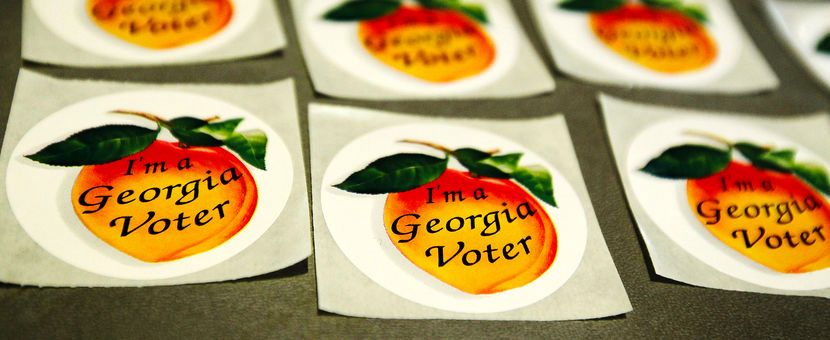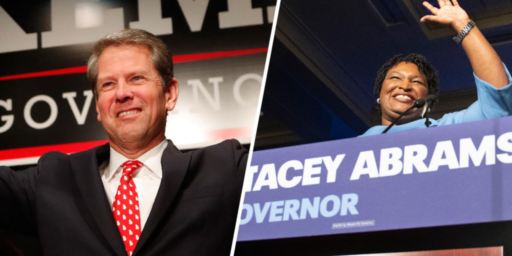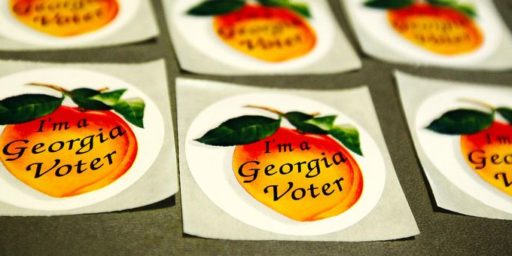Georgia Passes New Election Law
It makes voting harder.

As expected, the Georgia state legislature passed a new set of rules governing elections in Georgia, and Governor Kemp has signed the bill into law. This is one of several such legislative packages from across the country meant to address alleged problems in the US voting system.
It should be noted that the main “problem” with the 2020 election is that the Republicans lost the presidency and the Senate, all in the context of voting being easier in some states, Georgia included, due to pandemic-related measures. Voter turnout was also the highest it had been in roughly a century (how much of that was due to vote-by-mail being easier in many places and how much of that was the result of voter enthusiasm due to a highly polarizing incumbent plus pressing national concerns such as the heightened racial tensions and a pandemic is its own discussion).
WaPo summarizes the bill as follows:
The new law imposes new identification requirements for those casting ballots by mail; curtails the use of drop boxes for absentee ballots; allows electors to challenge the eligibility of an unlimited number of voters and requires counties to hold hearings on such challenges within 10 days; makes it a crime for third-party groups to hand out food and water to voters standing in line; blocks the use of mobile voting vans, as Fulton County did last year after purchasing two vehicles at a cost of more than $700,000; and prevents local governments from directly accepting grants from the private sector.
The 95-page law also strips authority from the secretary of state, making him a nonvoting member of the State Election Board, and allows lawmakers to initiate takeovers of local election boards — measures that critics said could allow partisan appointees to slow down or block election certification or target heavily Democratic jurisdictions, many of which are in the Atlanta area and are home to the state’s highest concentrations of Black and Brown voters.
Governor Kemp assessed the situation thusly:
Kemp signed it shortly afterward, saying at a news conference that with the new law, “Georgia will take another step toward ensuring our elections are secure, accessible and fair.”
“Contrary to the hyper-partisan rhetoric you may have heard inside and outside this gold dome, the facts are that this new law will expand voting access in the Peach State,” the governor added, noting that every county in Georgia will now have expanded early voting on the weekends.
Kemp deserves credit for standing up to Trump during the former president’s attempts at pressuring Georgia to overturn the clearly confirmed outcomes of last November’s vote. But, Kemp is clearly concerned about Trump and his allies attacking him when he seeks re-election in 2022. I also think it is not too cynical to note that Kemp won narrowly in 2018 and just saw the GOP lose the presidency and two US Senate seats narrowly in his state. If these new rules shave even a small amount of Black turnout in the state in 2022, that would be a boon to his own political goals.
I would note that based on the reporting I have seen I see no basis for the notion that “the facts are that this new law will expand voting access in the Peach State.” Likewise, while I am a proponent of elections that are “secure, accessible, and fair” I also see those are code words that tend, in this context (i.e., a Republican politician talking about the voting process) to mean “we just made voting harder.”
Another buzzword of note is “integrity,” which sounds great, but continually is associated with measures that make voting harder with only hypothetical results (or, at best, marginal improvements in actual integrity and security).
“Our goal is to ensure election integrity and to restore confidence in the election process,” said Sen. Max Burns (R), calling the measure a “well thought-out bill.”
Another Republican, Sen. John Albers, maintained that the measure “expands voting access in Georgia.” He accused critics of “sensationalizing and misrepresenting the truth.”
Rules of this nature, it should be continually emphasized, ultimately are about trade-offs. If you increase “integrity” in a way that makes it harder for thousands of people to vote while potentially catching one or two malefactors, that is a bad trade-off. This describes, I should note, voter ID laws, which can have the effects of making it difficult for thousands of voters to vote while stopping maybe one or two attempts at in-person voter fraud. That just isn’t a good trade-off, even if there is a decent theoretical argument for IDs.
Again, it is unclear to me how this bill does anything other than making voting more difficult.
The AJC has the following list of provisions:
-Absentee ballots will be verified based on driver’s license numbers or other documentation instead of voter signatures.
This replicates the concerns that exist about voter ID. Note that the objection is not about using ID in and of itself. The objection is about universality and access. Estimates of persons in Georgia without an ID range in the tens of thousands, and those are disproportionately Black citizens (with emphases in the poor and elderly communities). This is clearly a case wherein the rule that, in theory, promotes “integrity” and “security” almost certainly simply makes it harder for some populations to vote and in a trade-off that is weighed far more towards making it harder to vote than it is towards integrity/security.
Again: make voter ID free and universal (that last part is key, as I believe IDs are free in GA) and I will be on board with voter ID rules (add in automatic registration and I would be an enthusiastic supporter). Keep in mind “free” and “easy to obtain in rural parts of the state” are two different issues.
-Ballot drop boxes will only be allowed inside early voting locations and available strictly during business hours.
This is clearly a curtailment of access. While I understand the need for boxes to be secure, there has to be a way to secure them in a way that allows access outside of business hours. If mailboxes can be left outside, unattended with the need for this level of security, and one can deposit a vote in those containers, then surely there are ways to have drop boxes that are accessible outside of business hours.
-Weekend voting will be expanded for general elections, with two mandatory Saturdays offered statewide. Counties could also choose to offer early voting on two optional Sundays.
Let’s not mince words here: making Sunday’s optional is a way to target Black churches and their “souls to the polls” activities.
-Early voting for runoffs will be reduced to a minimum of one week because runoffs will occur four weeks after general elections.
-The deadline to request an absentee ballot will be set 11 days before election day.
I will admit that the exact amount of time between the general and the runoff is not, per se, sacrosanct in any way. Likewise, there could be good reasons to change the deadline for requesting ballots. All I can say here as a matter of fact is that these new provisions are more restrictive than the previous ones. But the degree to which they are problematic is open to debate.
-Members of the public will be prohibited from distributing food or water to voters waiting in line.
This targets practices directly associated with Black churches and civic groups-practices linked to encourage participation.
-The State Election Board could remove county election boards and replace them with an interim elections manager.
I would need to know about this, but this sounds like an invitation to meddle.
-A hotline to report illegal election activities will be set up in the attorney general’s office.
All well and good, I suppose. This strikes me mostly as a waste of time and money, and pity the poor person who has to sort through these calls.
-Counties will be required to certify election results within six days, instead of the 10 days currently allowed. Election workers will also be required to count ballots without stopping until they’re finished.
While there may be some neutral reason to want to change this time frame (like above for other timelines, there is nothing sacrosanct about 10 days over 6). And while one could argue it is more “secure” to count until they are finished, it sounds more like a recipe for increasing human error than a true “integrity” move.
So, while I am open to learning more and re-assessing my position, all I see here is a mix of ways that make voting a bit harder in Georgia and certainly nothing that makes me assess the system as substantially more secure, let alone “expand[ing] voting access in the Peach State.”
I will stick with my main two assessments: 1) Kemp wants to win back some of the GOP support that he lost when Trump attacked him over the 2020 elections, and 2) the state GOP knows that the state is competitive (we saw this in 2018 and 2020) and so any changes, even small ones, that could make it harder for Black voters to vote will help the GOP (including Kemp, if he makes out of the primary) given the fact that Blacks overwhelmingly vote Democratic (and legislation like this one will just deepen that fact, one suspects).
Let me close with both empirical and normative observations.
Empirically, both parties are clearly pursuing voting-legislation strategies that they think will aid them at the polls. This is a political fact that is utterly predictable. However, it also objectively true that legislation being pushed by Democrats is aimed at making it easier to vote and for voters to be treated equally. Republicans are clearly pushing for rules that making voting harder and that privilege some voters over others.
Normatively, therefore, one can choose sides based on partisan preference, but I would note that if one is pro-democracy (small “d” and all), then one ought to prefer the Democratic reforms over the Republican ones.
(The reality that the Democratic reforms are really band-aids on the gaping wounds of American democracy is its own, separate conversion. Just know that in that metaphor, the Republicans are seeking to worsen those wounds).




As I’ve said before, the beauty thing about being liberal is you can do well by doing good. Liberal mistakes tend to cost money and look silly. Conservative mistakes kill people. I saw yesterday a claim that a proper government response would have meant 400,000 fewer COVID deaths.
Yeah but I think they may have fucked up. That criminalizing water thing was a bridge too far. If Twitter is any indication, Georgia Democrats are lit. Usually it’s hard to motivate people for the midterms, but I think it’s gonna be different this time.
I just read somebody on Twitter say that if you look at that photo of him signing the bill and all the white guys standing around, in the background there’s a painting on the wall, by the artist Olessia Maximenko, and the painting is of Callaway Plantation, a notorious plantation in Georgia that had over 100 enslaved people.
I think since many times Republicans enact “reform” laws they actually mean “suppression” laws, they react unfavorably to gun reform legislation, as they think it also means suppression.
@Teve:
Exactly. Thank god that if the Republicans are going to be anti-democratic and racist POS, we get some relief because of their sheer stupidity. With these guys it is never enough to win. They have to stick their finger in your eye too.
Meh. In D&D terms Kemp appears to be lawful evil in regards to these issues. I think that the only reason he “stood up” to Trump was that there was no legal way for him to help the President (not to mention trying to shore up the upcoming Senate run-offs).
If this law had been in place for the 2020 Presidental election, he would have had all the legal tools necessary to have done exactly what Trump had wanted.
This is not dissimilar to Kemp’s approach to his own election in 2018. Everything he did as Secretary of State that helped his own Governatorial election (purging the voting roles of potentially democratic leaning voters, making decisions that helped lead to long voting lines in democratic heavy districts, etc) was all legal.
These “reforms” may not workout for R’s in the manner they think. Yes they’ve made it harder for blacks to vote, but it is also motivating them, limitations on drop boxes, voting hours etc are likely to present difficulties for older and less motivated white voters, who won’t have a cadre of younger voters to assist them and lastly, these voting restrictions are polling horribly in the suburbs that have been trending Dem and push more of those voters to Dems.
@mattbernius:
To the lawful evil point, this was an example of type of statement that the Gov’s office was issuing:
BTW, for extra racism points, apparently, the picture that was directly behind Kemp during the signing was of Callaway Plantation, which at its height had over 100 Slaves working there:
https://twitter.com/Will_Bunch/status/1375434696671256581
Oh one last thing:
I agree about Rural, but “easy to obtain” can also apply to urban areas depending on the placement of DMVs. For example, here in Rochester, NY a past Republican County Executive closed the downtown DMV. Which meant that city residents without cars had to take multiple bus via transfers (literally taking hours depending on where they were situated) to get to the far less accessible suburban DMVs.
Our recently elected Democrat CE reopened the downtown DMV.
Maybe time to rethink overturning Section 4 of Voting rights Act.
@mattbernius:
That. There was a lot of talk about how the system worked and Republican officials showed integritude by processing the vote properly. Seemed to me the only Republicans doing their duty were those subject to legal penalties if they didn’t.
The experience in the western vote by mail states is that boxes made out of steel panels somewhat heavier than mailboxes, with a narrow slit, bolted solidly to the concrete, with 24/7 video coverage is sufficient. Of course, the trend in western states for years has been towards more vote by mail — it is immensely popular with voters of all stripes. Yes, I’m aware of what the Republicans in Arizona are attempting — even assuming the legislature passes it and the term-limited governor signs it, the chance such changes will survive the referendum process there is vanishingly small.
It’s really kind of stunning, what joke the Republican party has become, in a relatively short time.
@Daryl and his brother Darryl:
I mean…it’s probably not a good sign, for the viability of your party, when your main policy initiative is to stop people from voting.
@Daryl and his brother Darryl:
Dr. Joseph Dolan: You know, it’s a shame about Ed.
Fletch: Oh, it was. Yeah, it was really a shame. To go so suddenly like that.
Dr. Joseph Dolan: Ahh, he was dying for years.
Fletch: Sure, but… the end was really… very sudden.
Dr. Joseph Dolan: He was in intensive care for eight weeks!
Fletch: Yeah, but I mean the very end, when he actually died. That was extremely sudden.
Let’s not forget that a major root of these efforts is the BS that the 2020 was rampant with fraud and that Trump won by a landslide. We, here, all know that it’s BS. But how many Republicans have admitted it? I’m afraid that it’s being lost in the details of giving water to people in line and the other things that the good professor brought up here. If 1/3 of the country continues to believe the BS, then this sort of thing will continue and be given legitimacy. (I wish I knew how to counter it.)
@reid:
Raffensperger in Georgia and Ducey in Arizona are the only two that come immediately to my mind, but my memory for details isn’t what it once was. I know the Arizona GOP sanctioned Ducey for it, don’t know about Raffensperger. Ducey is term-limited and has said he’s not running for the AZ Senate seat in 2022. Should any of the weird vote-limiting bills make it through the legislature in Arizona, I would not be surprised if Ducey vetoes them.
The AZ Republicans seem to be, for the most part, following the Republicans in CA and CO, who dived down the rabbit hole when the population shifts turned against them.
@reid:
There is no way to counter it. You can’t pierce that bubble. The last couple of years when I’ve been saying I don’t know if America is going to survive conservative media, I wasn’t joking.
There are reasons to be optimistic. Young people are, by and large, not clueless bigots who fall for trickle-down nonsense. I think the trend lines are good. Reagan got a lower percentage of the popular vote than Nixon, Bush got a lower percentage than Reagan, Trump got a lower percentage than Bush.
As always, the question I want some reporter to ask at the press conference is “Sir, what do you believe the appropriate ratio is? How many eligible voters who want to vote is it acceptable to prevent or dissuade, in order to avoid one fraudulent vote?”
@DrDaveT:
if anyone had the stones to ask the question, they’d be shouted down by their fellow reporters. That is, if security didn’t body slam the reporter to the ground first.
@DrDaveT:
Kemp wouldn‘t accept the premise of the question. As Steven notes in the OP, Kemp has already stated to the press, “Georgia will take another step toward ensuring our elections are secure, accessible and fair.” On Twitter, Kemp claimed “I appreciate the hard work of members of the General Assembly to make it easy to vote and hard to cheat.” Of course, both of these statements are detached from reality.
Trump has done immense damage to governance in the US, but more harmful has been his assault on truth and his playbook will be followed for all time now by his wannabe authoritarians. There is no pointed question from the press, no well-sourced investigative reporting, no conclusive collection of evidence, and no data supported study that can’t be dismissed out of hand by a charge of “fake news” or an accusation of political bias against the challenger.
I never cared for the “gotcha” journalism of the Tim Russerts of the news world, but it did sometimes work to hold people to a common set of facts. Now, you can spray the Capitol Police with bear repellent spray and “someone” can claim instead it was hugs and kisses without being universally mocked for the blatant absurdity.
Kemp has no reason to tell the truth, as no one has the ability to hold him to account when he lies.
I don’t have too many presidential election cycles left in me but I’m certain that I will live to see the Republican party outright steal an election simply because they have given themselves the power to do so.
@Scott F.:
GOP disdain for truth and facts long predates Trump, and has been building, Trump merely gave it a boost.
@charon: What would you have Republicans do? They can hardly run on their policies.
@Scott F.:
Yes, I saw him interviewed on the news tonight. He is clearly taking the position that anyone who wants to vote (legally) can, and if they don’t it has nothing to do with this law. Any assertion to the contrary is just partisan sniping.
@charon:
This seems to be the prevalent opinion, along with “trump is a symptom, not the disease.”
IMO, Trump was, or is, a catalyst. He may not have changed the reaction going on in the GOP, but he damned sure accelerated it and raised its temperature. He also showed how far a committed base is willing to follow someone who openly caters to their prejudices, and how plaint the GOP establishment is.
Like it or not, and I don’t, the Orange Ass had a transformative effect on a once serious political party.
@charon: yeah one smart thing that Trump did early on is that he would say a bunch of things, and if something didn’t get applause, he stopped saying it, and if something got a lot of applause, he said it a lot more. In a sense, Trump is the result of a huge GOP focus group.
@charon: I’d only argue with your use of the word ‘merely.’ Saying Trump merely gave political falsifying a boost is akin to saying that war predated the atom bomb. The magnitude of Trump’s lying and thoroughness of his ability to escape the consequences are massive expansions of the precedent.
The water bit is especially gratuitous and I wonder how well this is going to play in non-cracker America. Atlanta makes money dealing with non-cracker America. Imagine a bunch of gun-toting imbecile crackers livid because water is being handed out to voters and try to pick a side here. I think the hammer is going to drop here with boycotts and threats, and it’s going to push the crackers even closer to the edge.
@Scott F.:
The GOP discovered lying gets them what they want long ago and ever since they have been hooked on it like a drug, complete with an ever increasing need. So I reject your analogy, they were always destined to get where they are, Trump just possibly got them there sooner.
@charon:
Someone long ago analogized Trump to an opportunistic infection which I think is about right. Trump discovered an ecological niche and filled it, but the niche was already there.
I may well travel to Georgia next cycle and pay a catering service to set up on the sidewalk outside a black voting line, along with a couple of pallets of water bottles.
This seems like a great opportunity to test some laws and force some judges to decide what side of history they want to be on.